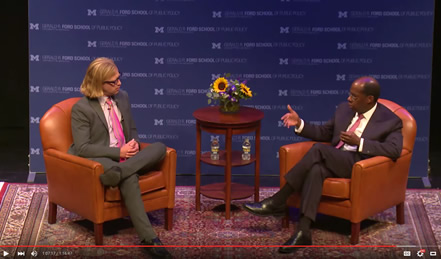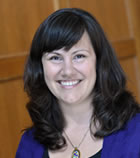|
Is this email not displaying correctly? View it in your browser. |
October 27, 2015 |


Sue Dynarski earns top NASPAA public service award
Professor Susan Dynarski has been named a recipient of the "Public Service Matters" Spotlight Award by the Network of Schools of Public Policy, Affairs, and Administration (NASPAA). The award recognizes Dynarski's tireless scholarship and advocacy on college affordability, student debt, and access to higher education. more »
New book from Luke Shaefer, Kathryn Edin spurs conversation on extreme poverty in the U.S.
$2.00 A Day: Living on Almost Nothing in America has been covered widely by national press in recent weeks, including author interviews and citations published in The New York Times, The Atlantic, Mother Jones, Vox, The Huffington Post, PBS News Hour, Marketplace, and The Washington Times, among others. more »
Barry Rabe poll finds growing belief in global warming
A majority of Republicans now believe there is solid evidence of global warming, according to a new poll released by Barry Rabe and the National Surveys on Energy and the Environment. Rabe cites changing and extreme weather conditions as a factor. more »
Ford School launches Diversity, Equity, and Inclusion Strategic Planning initiative
The Ford School has launched a major strategic planning initiative around diversity, equity, and inclusion. The effort is part of a broader University of Michigan push to enhance diversity and promote greater equity and a more inclusive campus environment. more »
Aging population a threat to Social Security

Former Federal Reserve vice-chair and current TIAA-CREF CEO Roger Ferguson visited the Ford School for a conversation hosted by Justin Wolfers. The two experts spoke about retirement savings, financial literacy, and more—including the broader challenges of an aging population. “When Social Security was started, the ratio of retirees to working people was one to 15 or something like that,” said Ferguson. "Over the next five or ten years, we'll go to one retiree for every two folks working. That clearly will have big implications for the economic viability of these programs." Watch complete video here.
MEET OUR NEW FACULTY

John Leahy: Allen Sinai Professor for Economic Policy
John Leahy joins the faculty as the Allen Sinai Professor of Macroeconomics, a joint appointment between the Ford School and the Department of Economics. Leahy is a leading authority on macroeconomics, serving as a coeditor of the American Economic Review and as a visiting scholar to the Federal Reserve Banks of New York, Philadelphia, and Kansas City. more »

Social welfare expert Natasha Pilkauskas
Natasha Pilkauskas is now an assistant professor of public policy. Pilkauskas' research broadly focuses on the health, development and well-being of low-income families and children. She is particularly interested in the role that private support networks play in helping families make ends meet. Pilkauskas received a Master of Public Policy from Harvard University and a PhD in Social Welfare Policy from Columbia University. more »
HEADLINES
"We are in the middle of the most important social movement for police reform in a half century. The focus and moral certainty that have fueled the Black Lives Matter movement have opened a rare window of opportunity for real and lasting change." David Thacher's post "Don't End Broken Windows Policing, Fix It," published on The Marshall Project.
"...(I)n a financial market, randomness may be the norm, even if in much of the rest of our lives, order and predictability is the norm." Justin Wolfers on why our instincts may make us poor investors.

Ford School graduates at work
The policy interests of Ford School students and alumni are diverse— they're local and global, corporate and not-for-profit, educational and economic.
Insight to action: the Ford School Faculty
Poverty and economic development. Health and human security. Energy and the environment. Alongside their critical work as teachers and mentors, Ford School faculty members are nationally and internationally recognized experts in these and other vitally important policy areas. Learn more about our faculty.
|
Gerald R. Ford School of Public Policy | Contact us 
|